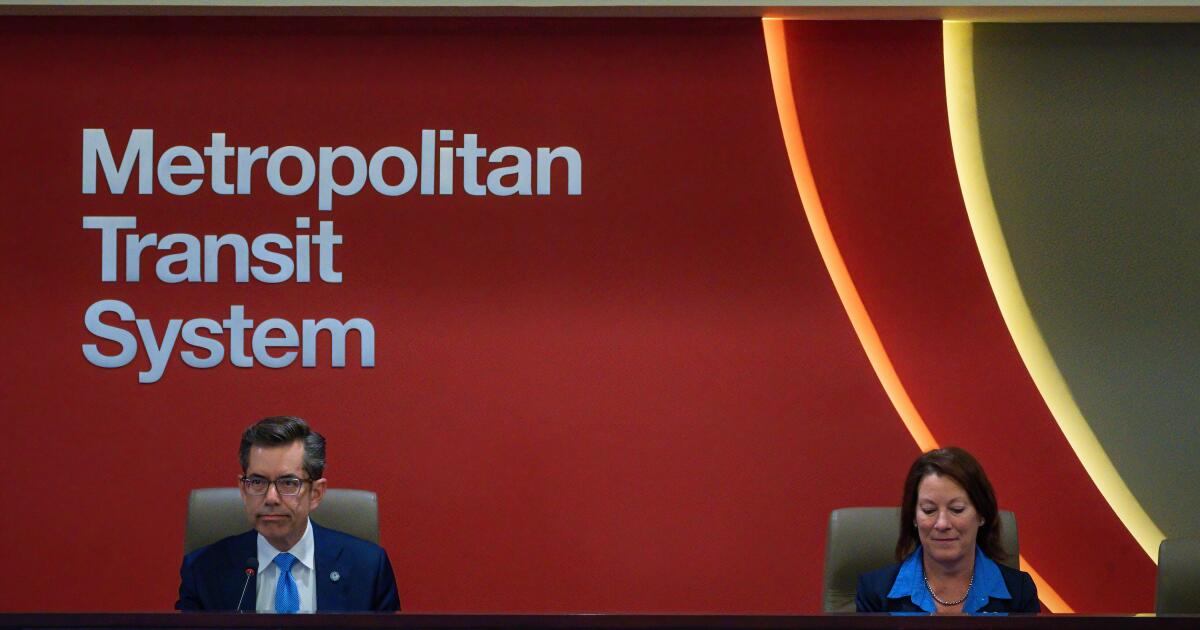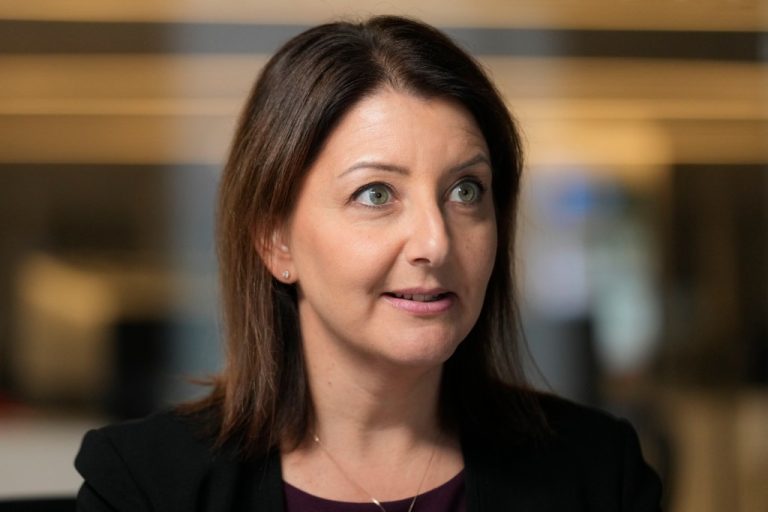

No one at San Diego Metropolitan Transit System knew about any improper relationship between former board chair Nathan Fletcher and a public relations specialist before she was fired last year, a review commissioned by the agency and released Thursday concluded.
Investigators also said former PR specialist Grecia Figueroa had been repeatedly warned about her work habits before she was let go, and included several quotes from performance evaluations in their findings.
The investigators also reviewed internal emails along with the job evaluations but only referenced the documents. They were not themselves released in full.
The report, which was independently conducted by the Oppenheimer Investigations Group but funded by the public transit agency, concluded that the said improper meetings and communications between Fletcher and Figueroa had no bearing on the woman’s 2023 termination.
Figueroa sued MTS and Fletcher early last year, saying that he sexually assaulted her on two occasions inside agency headquarters and sexually harassed her over more than a year and that she was wrongfully fired to protect him.
Fletcher, the once-powerful chair of the San Diego County Board of Supervisors and MTS board, denied the accusations but acknowledged what he said was an inappropriate relationship. But he resigned from both and ended a nascent campaign for state Senate amid the allegations.
The investigation “did not uncover evidence that anyone from MTS had knowledge or suspicion of a personal or intimate relationship, either consensual or non-consensual, between Fletcher and Figueroa prior to Figueroa’s termination,” the investigators wrote.
“Nor was there evidence that MTS terminated Figueroa at the recommendation or direction of Fletcher,” they added.
Lawyers for Figueroa said in a statement Thursday they were disappointed but unsurprised by the findings.
“These purportedly independent results simply spout baseless ‘performance issues’ as a means of avoiding liability when it is clear that Ms. Figueroa was thriving at work before Fletcher announced his run for political office,” the statement said in part.
The outside review rebuts allegations in a lawsuit Figueroa filed last March, days after Fletcher announced he was suspending his Senate campaign. Figueroa, who was hired by MTS in 2019, had been fired in February.
Fletcher acknowledged what he said were inappropriate communications and encounters with Figueroa but denied the assault and harassment allegations. He resigned from the MTS board in the wake of the lawsuit and later from the county Board of Supervisors.
MTS hired the Oppenheimer team last April to review the allegations and the public record and also to interview people who may have known about Figueroa’s firing or her allegations against Fletcher.
The investigation, which cost the transit agency about $120,000, was completed last month but not released until Thursday.
The 90-page report includes summaries of interviews with more than two dozen MTS employees and board members — and numerous redactions related to prior allegations of sexual harassment within the organization.
All of the board members questioned by the investigators said they were unaware that Fletcher and Figueroa had been communicating until her lawsuit made the news in late March.
Several complained that MTS staff did not inform them about the potential for a lawsuit until after the case had been filed, even though senior transit agency officials had been holding settlement discussions for more than one month.
Four board members speculated that they may not have been alerted because the case involved a powerful politician.
All of the senior MTS staff interviewed by investigators said they did not learn of contacts between Fletcher and Figueroa until after the PR specialist was terminated.
The report included a quote from MTS General Counsel Karen Landers that investigators called “a plausible explanation” for why they did not immediately report information about the relationship to the board.
“While we prefer (board members) not have relationships with employees, that in and of itself is not illegal,” Landers said. “So if it was purely consensual and voluntary, that puts us in a bad position because I have no policy that tells them they can’t do that.”
Figueroa’s coworkers and supervisors also answered questions from the two investigators.
Her bosses said Figueroa showed promise in several areas of her work responsibilities but was not performing well and cited problems with completing assignments, arriving late and missing deadlines.
Communications Director Mark Olson, her direct supervisor for much of her tenure there, “told Figueroa that she was good at 35 percent of her job but that she needed to ‘step up’ in the other areas that amounted to 65 percent of her work,” the report says. “Olson said, ‘I wanted to make it clear that these were opportunities to improve as opposed to critiques.’”
By early 2023, however, Olson and his superiors had decided to fire Figueroa, a decision that “didn’t come lightly,” investigators wrote.
Figueroa was told of her firing on Feb. 6, the day Fletcher announced his Senate campaign — although human resources chief Jeff Stumbo told investigators that she technically was not fired that day.
Rather, because Figueroa expressed surprise at the decision during a meeting that day, he sent her home with pay until a separation agreement could be reached, Stumbo told investigators. No such agreement was reached, and Figueroa was formally terminated Feb. 17.
Figueroa alleged in her lawsuit that her firing was related to Fletcher‘s campaign announcement. Stumbo said he initially planned to meet with Figueroa on Feb. 3, a Friday, but she was out that day.
While marketing department coworkers described Figueroa to investigators as pleasant and nice, one also described her as “combative” and another said she was not known around the office for doing exemplary work. The coworkers’ names were redacted from the public report.
“Over the three years they worked together, almost every project worked on with Figueroa was ‘a last minute crisis’,” the report said, quoting one colleague.
Most of the investigative interviews were conducted by video conference, the report noted.
Fletcher only answered written questions in writing.
Figueroa and her legal team could not agree to terms for an interview with investigators, so she did not participate in the review.
The quotations included in the findings may not be verbatim, the investigators stated, but were transcribed as accurately as possible.
The lawsuit is expected to go to trial in San Diego Superior Court sometime next year.







